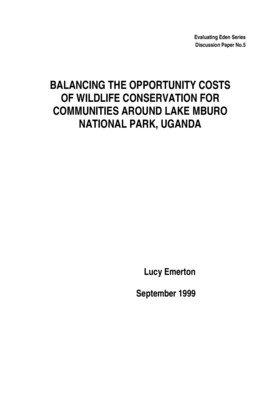Balancing the Opportunity Costs of Wildlife Conservation for Communities around Lake Mburo National Park, Uganda

Lake Mburo National Park, Uganda was established in 1982, resulting in the forced eviction of those living inside the park boundaries. To address the resulting economic and social conflicts that have arisen, a community-based approach to wildlife conservation in and around the park has been established. This paper discusses the economic impacts of this approach, and the existing competition between protected areas and agricultural land uses.~It is found that the costs of managing the Park the expenditures on park management, crop and livestock damage by wild animals, loss of productive land and restrictions on resource utilisation - effectively outweigh any benefits revenues from resource utilisation and budgetary contributions from external sources. As a result, a situation on the ground exists, where the conservation of the Park is effectively being subsidised by the local residents and external donors. It is concluded, that to address this problem, there must be an increasing emphasis placed on establishing more innovative mechanisms to finance this gap between wildlife-related income and expenditure on conservation. One solution may be to involve the private sector to a greater degree.
Cite this publication
Available at https://www.iied.org/7798iied